Wednesday, 9 September 2020
The combined effects of meditation and magic mushrooms
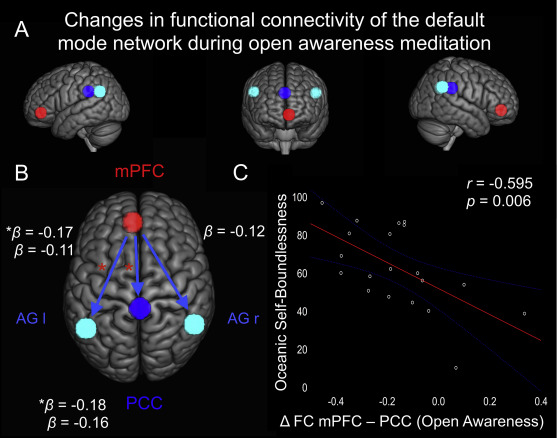
Today I want to tell you about a study entitled “Psilocybin-assisted mindfulness training modulates self-consciousness and brain default mode network connectivity with lasting effects,” which a research team from the University of Zurich published in the journal NeuroImage in August 2019. As the title suggests, this study combined two methods of modulating the brain: engaging inmindfulness meditation and taking the hallucinogen psilocybin, a psychoactive molecule found in “magic mushrooms”. Previous studies had shown that both of these methods produced a similar effect: they gave subjects the impression that the boundaries between their bodies and their environments were dissolving (a state of consciousness often referred to as ego dissolution). But in this study, the research team wanted to find out whether combining these two methods might make this effect stronger and longer-lasting. (more…)
The Emergence of Consciousness | Comments Closed
Tuesday, 18 August 2020
How labelling brain parts functionally can be overly simplistic: the cerebellum as a case in point
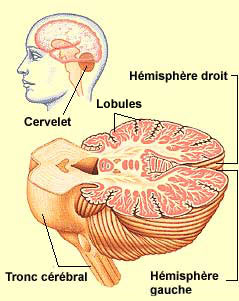
Today I’d like to talk about the cerebellum. To introduce this topic, I’ll remind you that as animals’ bodies evolved and became more complex, they were subjected to greater adaptive pressures to move more and more efficiently, and the cerebellum is a brain structure that was closely involved in this process.
Here’s the most surprising fact about the cerebellum. The human brain as a whole contains about 86 billion neurons. The cerebral cortex accounts contains about 16 billion of these neurons and accounts for about 80% of the brain’s weight. In contrast, the cerebellum accounts for only about 10% of the brain’s weight, but contains nearly 69 billion neurons! Thus more than three-quarters of the neurons in the human brain are located in the cerebellum, even though it is a small structure compared with the brain as a whole. (more…)
Body Movement and the Brain | Comments Closed
Tuesday, 21 July 2020
How neuronal communication began, and how brains differ from computers
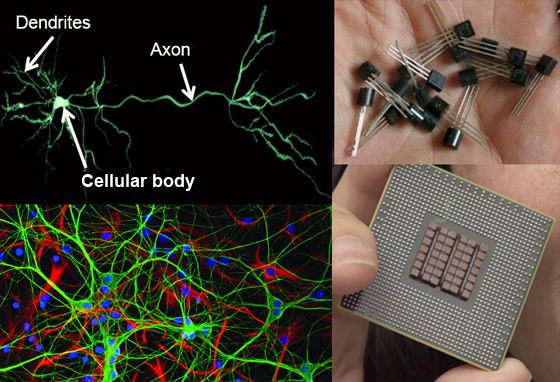 When you move through space, your sensory perceptions change constantly, in real time. What we call cognition can be equated with this uninterrupted flow of perception and action through by a body and a brain located in an environment. But as scientists have now told us, the modern human brain contains many neurons that are neither sensory nor motor—so many that it can sometimes be hard to realize that this perception/action loop is still the foundation of the nervous systems of primates and other animals. These interneurons, as they are called, receive nerve impulses from sensory neurons and transmit signals to other neurons, and so on. And at some point in time, after all sorts of indescribably complex detours, a motor neuron will receive signals from some of these interneurons and then be able to command a muscle to contract to make a body part move.
When you move through space, your sensory perceptions change constantly, in real time. What we call cognition can be equated with this uninterrupted flow of perception and action through by a body and a brain located in an environment. But as scientists have now told us, the modern human brain contains many neurons that are neither sensory nor motor—so many that it can sometimes be hard to realize that this perception/action loop is still the foundation of the nervous systems of primates and other animals. These interneurons, as they are called, receive nerve impulses from sensory neurons and transmit signals to other neurons, and so on. And at some point in time, after all sorts of indescribably complex detours, a motor neuron will receive signals from some of these interneurons and then be able to command a muscle to contract to make a body part move.
What distinguishes the nervous system from other communication systems in the human body, such as the endocrine and immune systems, is its speed. The time that elapses between a perception and a suitable bodily action in response can be a second or less. How do the myriad neurons in the nervous system manage to communicate with one another so rapidly? (more…)
From the Simple to the Complex | Comments Closed
Monday, 6 July 2020
Acute stress reaction initiated by a hormone secreted by the bones
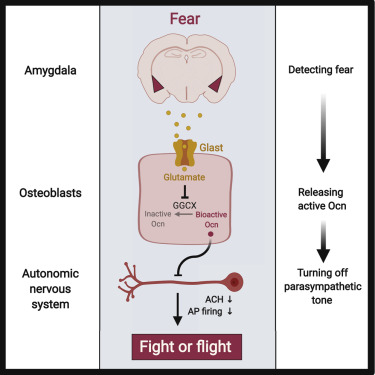 Today I’d like to tell you about an article published in the journal Cell Metabolism in September 2019. The article, entitled “Mediation of the Acute Stress Response by the Skeleton”, reports a discovery that is surprising, to say the least. Apparently, all on its own and in just a few minutes, osteocalcin, a hormone produced in our bones, can initiate the physiological changes associated with acute stress, such as increased heart rate, respiratory rate and blood pressure. (more…)
Today I’d like to tell you about an article published in the journal Cell Metabolism in September 2019. The article, entitled “Mediation of the Acute Stress Response by the Skeleton”, reports a discovery that is surprising, to say the least. Apparently, all on its own and in just a few minutes, osteocalcin, a hormone produced in our bones, can initiate the physiological changes associated with acute stress, such as increased heart rate, respiratory rate and blood pressure. (more…)
Body Movement and the Brain | Comments Closed
Thursday, 18 June 2020
Our brains have not evolved to handle so many electronic inputs
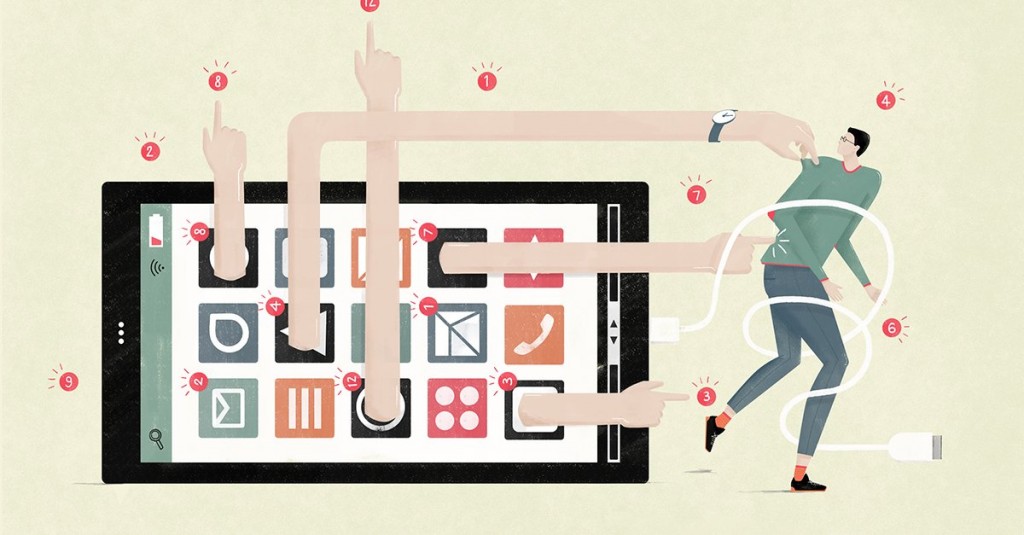
For almost all of our long evolutionary history, we human beings have lived in calm, quiet natural settings such as the African savannah in the photo below. From time to time, our attention might have been caught by a slight movement in the distant grass, or by an unusual sound such as the cracking of a branch, because either one might have signified an animal that we could hunt for dinner, or one that was hunting us for its own dinner. To survive, we had to pay immediate attention to such unexpected stimuli. Those of us who didn’t because we were just a bit too relaxed didn’t survive long enough to pass our genes on to descendants.
As a result, all of the human beings who are alive today are descended from those individuals who were the most sensitive to such sudden stimuli from the outside world. Our brains are “wired” to pay attention to these stimuli. But the problem is that the world that we have been living in for the past decade or two, with the constant flood of incoming information from the Internet, e-mail and social media, is completely different from the one that shaped the brains that we must use to respond to it. This explains the problems of attention control that I’ll be discussing in a moment. (more…)
From Thought to Language | Comments Closed







